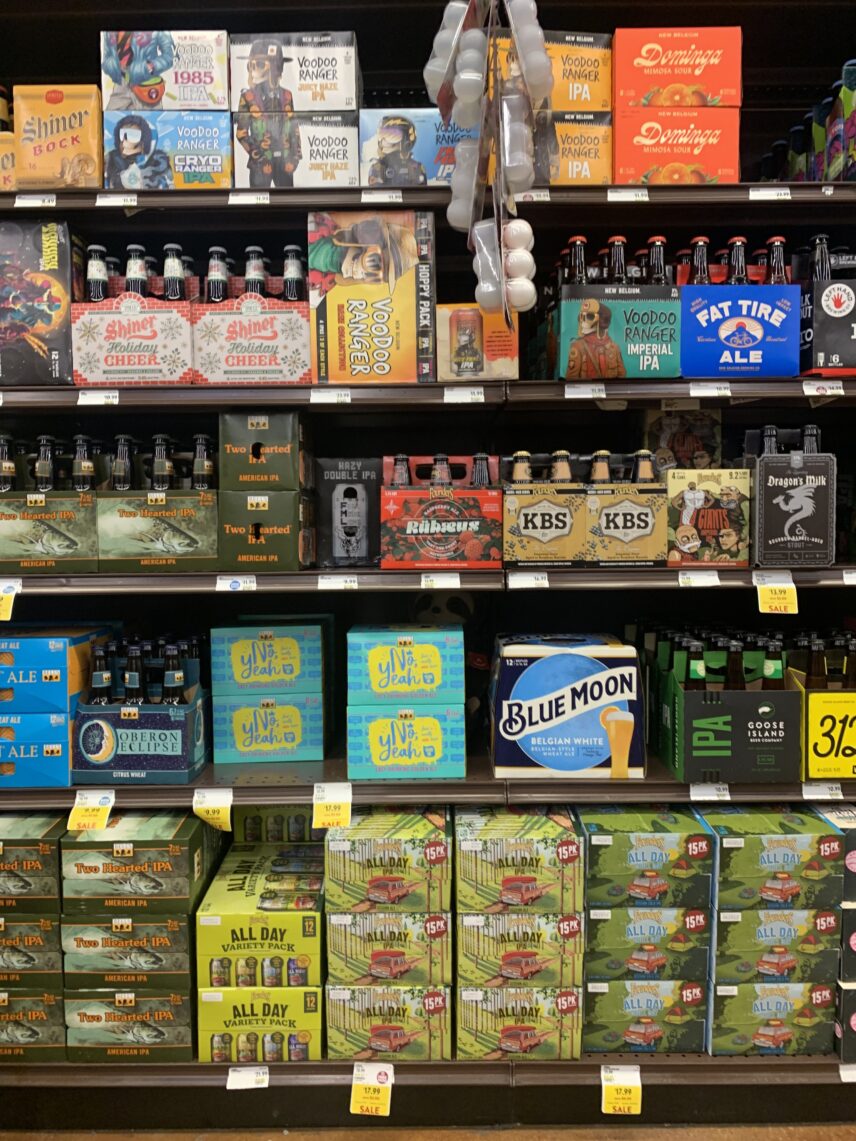Article begins
Walking through my local Indianapolis grocery store, I can find an assortment of beers organized from big commercial brands like Heineken to popular craft brews such as Dogfish Head IPAs to regional favorites like Sun King ale. However, my view of these beers has been deeply impacted by my ethnographic research on beer and brewing in Ethiopia. Specifically, as I scan the beer shelves, I dwell on industry practices of commercial deception; the complex relationship between alcohol, conflict, and modernity; and the global appropriation and erasure of indigenous beers for profit.
Regarding corporate deception, I think about how multinational alcohol companies such as Heineken, Anheuser-Busch InBev, Diageo, and the Castel Group stealthily buy up national or craft breweries and retain local nomenclatures, rendering their corporate presence in Africa invisible. For example, Heineken’s brand portfolio in Africa includes a multitude of “regional” beers either partially or fully owned by the multinational. Walia (Ethiopia), Star (Nigeria), Ngok’ (Congo), and Windhoek (Namibia) are some of the company’s most popular “local” beers, which are either newly created brands or long-standing ones acquired through corporate buyouts. This strategy of amassing a large portfolio of beer labels and making them appear local through branding is not unique to Heineken (or Africa) but is industry practice—a marketing strategy distinct from multinational beverage companies like Coca-Cola, in which the corporate brand remains visible but is marketed locally.

Considering the complex history of alcohol, the exploitative practices of multinational companies in Africa are often hidden under the guise of modernity. For instance, Olivier van Beemen chronicles the abuses perpetrated by Heineken on the continent despite company claims to bring economic benefits, such as jobs, to African nations. His critique goes beyond issues arising from the prohibitive, addictive, and intoxicating properties of alcohol itself, such as underage drinking, alcohol use disorder (alcoholism), and destructive drinking behaviors. Accusations include tax evasion, support of authoritarian leaders, and complicity in war crimes in countries like Burundi and the Democratic Republic of Congo. In my own research, the relationship between Heineken and Ethiopia is a bit more nuanced due to the limited success of its CREATE initiative, a corporate social responsibility program that focuses on increasing the country’s domestic malt barley supply chain.
And finally, I reflect on the erasure of indigenous beers for capitalistic purposes through the stamping out of noncommercial beers. As one manager at a global alcohol company so proudly declared to me during my fieldwork, “Before we arrived, ṭella [an indigenous beer]was more popular than bottled beer. We remade the market.” Bottle beer is a technology set to supplant local indigenous beers due to commercial production and cheap prices—a process of creative destruction. But also, the mass availability and access to commercial beer recast the local meanings of indigenous alcohols through comparisons, specifically within an urban public imaginary, as people pit the “modern” bottle beer against “traditional” indigenous alcohols such as ṭella.
Glancing across the grocery store shelves, I now have an awareness of the complex global reality of commercial beer and brewing concealed by mass advertising and consumer narratives and the industry’s huge efforts to influence my own drinking choices and those of others. But despite this, I must admit that I reach for a Blue Moon, a faux craft beer created in the 1990s in Denver, Colorado, and owned by the multinational Molson Coors. At the center of a handful of controversies, Blue Moon has received the ire of the Brewers Association, an independent trade group of breweries in the United States, due to misleading advertising, and settled out of court for its initial claims of being a Belgian beer, an accusation of appropriation. Even so, the brand’s effective marketing, price point, and manufactured taste make it an unshakable favorite brand for some in my household.
Overall, I’ve found that it is a fantasy to think one can totally escape the reach of corporate beer—especially while doing field research. The rapid buying up of craft breweries, obfuscating marketing techniques, and frequent mergers and acquisitions make it quite difficult to figure out what is what. Still, as a scholar of beer and beer brands, I encourage everyone to take a deep dive into the social life of their favorite beers rather than uncritically accepting the fetishizing marketing ploys of alcohol companies and their numerous brands.
Ariana Gunderson is the section contributing editor for the Society for the Anthropology of Food and Nutrition

